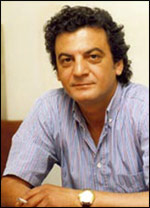 When will I understand his distant repose?
When will I understand his distant repose?
He carried his few belongings,
the grief in his eyes
the asthma and the new clothes.
He never looked back, as if he knew the road well,
but he regretted a few things.
Of these, I know of the canary that died from the cold,
the ring
and his slowness in parting,
as if she had beaten him to his own appointment,
and left the years to burden him.
He never looked back.
He had not travelled this road before,
but the cypresses guided him.
There were no bends in the road
nor turnings?
nor anything to charm the eye.
A road, like the air or a breath,
empty.
A road, like prayer,
like the loneliness of missing talk between lovers,
of the heart’s longing to confess for its own peace.
A road like hardship without reason
but arising in all reasons.
A road like all roads.
They know they begin
and know they will be traced between two points to the distant horizon.
A road like roads
that do not know what lies beyond the horizon
and would not recognise the horizon
if not for the setting sun.
He never did look back.
He saw none of us.
He looked distractedly through the doorway, and at the door
and then surrendered his gaze to the plants on the balcony.
He saw no one,
but left his voice with us.
The softness of his palms.
He hadn’t known this road before,
but he set out
confident.
A road, like the bout of unconsciousness
that deprived him of speech
and made him to a gaunt spirit on the bed.
A road, like the alleys
that received his soured body
with their dim lighting.
A road, like a dream
without end,
filled with creatures of faded shadows and
silence, as if a sanctuary for voiceless beings.
He did not look back,
so the canary that died from the cold,
the ring in its box
and his two swollen feet
failed to help him on his journey.
When will I understand her distant repose?
She was caressing her son
when she told him: “If you catch the butterfly
the butterfly will teach you to fly.”
She carried her few belongings,
the ambiguous brightness in her eyes,
the burning summer sun
and her new blue dress.
She never looked back,
as if she knew the road well.
But she regretted a few things
that I do not know.
Perhaps now he knows.
And perhaps she no longer makes him cry
among the flower-pots of basil, cacti and jasmine.
Translated by Camilo Gomez-Rivas
from the author’s collection Bidha’at Ashia’a [A Few Things], Dar al-Jamal, Cologne, 1997
---------------
was born in 1955 in Sûr (Tyre), Lebanon. He has a Diploma of Advanced Study in Philosophy from the Sorbonne. He was cultural editor on the Lebanese newspapers An-Nahar and Al-Safir and now works for Al-Mustaqbal in Beirut. Since 1980 he has published ten collections of poetry and translated from French several novels, poetry collections and books of philosophy and literary criticism.